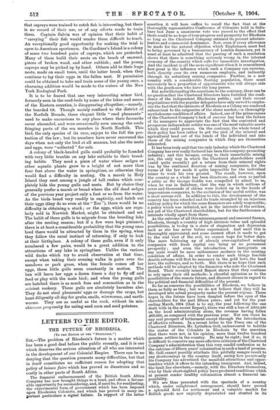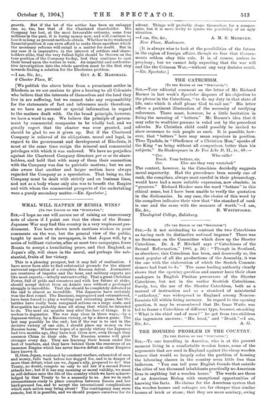in the development of our Colonial Empire. There can be
no denying that the question presents many difficulties, but that in itself constitutes no sufficient reason for adopting that policy of laissez faire which has proved so disastrous and so costly in other parts of South Africa.
The financial embarrassment of the British South Africa Company has now brought things to a head, and offers a favour- able opportunity for reconsidering, and, if need be, for readjusting, the experimental form of government which has been imposed upon Rhodesian Colonists, and which has proved in many im- portant particulars a signal failure. In support of the latter
assertion it will here suffice to recall the fact that at the thoroughly representative Conference of Colonists held in Salis- bury last June a unanimous vote was passed to the effect that there could be no hope of true progress and prosperity for Rhodesia so long as the Chartered Company retained its present adminis-
trative and commercial dominance. Now, even if every allowance be made for the natural objection which Englishmen must feel to being governed by a bureaucracy of London financiers, yet it
must at least be admitted that the passing of such a resolution shows that there is something seriously wrong in the internal economy of the country which calls for immediate investigation. And the incident is all the more significant when it is remembered
how great is the influence which such a Company can exercise, both directly over its own numerous employes, and indirectly
through its subsidiary mining companies. Further, in a new country with a considerable floating population, there must necessarily be a proportion of opportunists who will always side with the gentlemen who have the long purses.
But notwithstanding the assertions to the contrary, there can be no question that the Chartered Directors have forfeited the confi- dence of the independent Rhodesian public ; and their recent negotiations with the popular delegates have only served to empha- sise the fact that the interests of Rhodesia as a Colony are rendered subservient to the exigencies of the share market—a thoroughly unwholesome condition of affairs. Indeed, one of the prime causes of the Chartered Company's lack of success has been the failure of its managers to appreciate the fact that the contented and prosperous independent settler was one of the most valuable assets which they could possess. On the contrary, the whole trend of their policy has been rather to get the pick of the mineral and agricultural land out of the hands of the individual and into those of the mining companies in which they are themselves interested.
It has been truly said that the only industry which the Chartered Company has ever really fostered has been the company-promoting industry; and this because, owing to their remarkable mining
law, the only way in which the Chartered shareholders could (until quite recently) get a return from their mineral rights
was by the continual flotation of mining companies, for the terms of the law made it quite impossible for the individual miner to work his own ground. The result, however, upon the country as a whole has been disastrous, and even so partial a critic as Sir George Goldie was compelled to admit to us, when he was in Salisbury, that the way in which millions of acres and thousands of claims were locked up in the hands of impecunious companies, to the exclusion of the useful settler, was a most serious evil. In addition to this, the development of the country has been retarded and its trade strangled by an injurious railway policy for which the same financiers are solely responsible; a policy which was initiated, not in the interests of the settlers, nor yet of the Chartered shareholders, but for the furtherance of interests wholly apart from these.
As the outcome of all this mismanagement and unsound finance, Rhodesia, though a country of high intrinsic value and splendid possibilities, is to-day in a state of stagnation and depression
such as she has never before experienced. And until this is thoroughly appreciated, and some earnest effort is made to get
to the real root of the evil, we cannot hope for better days.
The mere bolstering up of already over-capitalised mining companies with fresh capital can bring us no permanent prosperity ; and even the introduction of immigrants on any scale would be mere midsummer madness in the existing condition of affairs. In order to render such things feasible drastic reforms will first be necessary in the gold laws, the land laws, the railways, and so forth. But there is no hope that such methods will be adopted by the financiers who rule the Chartered Board. Their recently issued Report shows that they continue to rely upon their old methods : a cheerful optimism as to the possibilities of the remote future, and discreet silence in regard to the political and financial difficulties of the present.
So far as concerns the possibilities of Rhodesia, we believe in them as fully as they; but we do not believe that they will be developed into actual prosperity under the present regime. These hopes in the future have been dangled before the eyes of the shareholders for the past fifteen years; and yet for the year ending March, 1904 (that is to say, the year following the one dealt with in the recent Report), there was still a loss of £304,000 on the local administration alone, the revenue having fallen X65,000, as compared with the previous year. Nor can there be any real prospect of betterment except through the introduction of effective reforms. In a recent letter to the Times one of the
Chartered Directors, Mr. Lyttelton Gell, endeavoured to belittle the status of the Colonists in Rhodesia by the assertion that there were not, in his opinion, more than twelve hundred genuine settlers in the country. He may be right; but if so, it is difficult to conceive any more effective criticism of the Chartered Company's administration than this very candid confession as to the outcome of fifteen years' colonisation in such a land of promise. Mr. Gell cannot possibly attribute this pitifully meagre result to any shortcomings in the country itself, seeing how persistently his Company has advertised the manifold attractions and oppor- tunities which it offers to the intending immigrant. And, indeed, the fault lies elsewhere,—namely, with the Directors themselves, who by their short-sighted policy have produced conditions which at present render healthy colonisation almost a financial im- possibility.
We are thus presented with the spectacle of a country which, under enlightened management, should have proved a splendid field for settlement and a valuable market for British goods now unjustly depreciated and stunted in its
growth. But if the lot of the settler has been an unhappy one, so, too, has that of the Chartered shareholder. His Company has lost, at the most favourable estimate, some four millions in the past, it is losing money now, and will continue to lose it so long as present methods obtain. Whether in its weakened financial position it can even afford to make those sacrifices which the necessary reforms will entail is a matter for doubt. But in any case it is imperative, in the interest of settlers and! share- holders alike, that the very fullest light should be thrown on the true position of the Company to-day, lest they continue to cast their bread upon the waters in vain. An impartial and authorita- tive investigation into the whole question must be the first step towards finding a solution for the Rhodesian problem.
6 Chester Place, W.
Rhodesia as we are anxious to give a hearing to all Colonists who believe that the interests of themselves and the land they live in are suffering, but we cannot take any responsibility for the statements of fact and inferences made therefrom, as we have no personal or special information in regard to the matters dealt with. On the broad principle, however, we have a word to say. We believe the principle of govern- ment by commercial companies to be wholly bad, and we greatly regret that the charter was ever granted, and should be glad to see it given up. But if the Chartered Company is relieved of its obligations, moral and legal, in regard to the government and development of Rhodesia, it must at the same time resign the ihineral and commercial privileges with which it was endowed. We have no prejudice against the Chartered Company directors per se or its share- holders, and hold that with many of them their connection with the Company was due to patriotic motives ; but we are also aware that another and larger section have always regarded the Company as a speculation. That being so, the
Company must be dealt with strictly and on business lines, and not as a body whose only aim was to benefit the Empire and with whom the commercial prospects of the undertaking were a purely secondary matter.—ED. Spectator.]











































 Previous page
Previous page